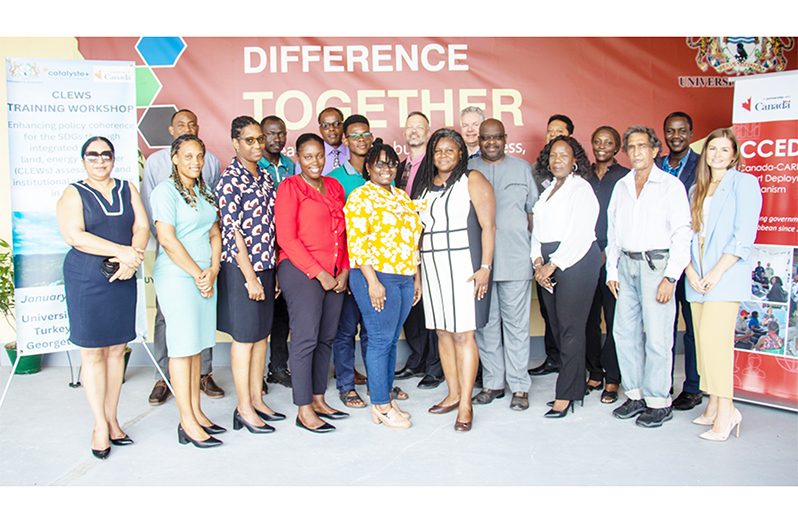THE University of Guyana (UG) in collaboration with Catalyste+, a Canadian development partner, recently hosted a weeklong modelling workshop aimed at strengthening the capacity of students, researchers, and government technical staff working on climate change, land, energy, and water resources management.
The workshop was held under the theme: “Enhancing policy coherence for the SDGs through integrated climate, land, energy and water (CLEWs) assessments and institutional strengthening in Guyana” and facilitated by Canadian expert, Dr. Taco Niet, Assistant Professor of Professional Practice, School of Sustainable Energy Engineering, Simon Fraser University in British Columbia.
The workshop was held at the University’s Turkeyen Campus and ran from January 15 to 19 and saw over 15 participants benefitting.
The initiative was supported by the Canada-Caribbean Expert Deployment Mechanism, a Canada-funded project.
This Caribbean-specific mechanism, managed by Catalyste+ (formerly CESO), is a partnership between Canada and national government entities to provide Canadian expertise to help build capacity in identified priority areas.
The workshop was aimed at providing participants with the skills to assess the interlinkages between resource systems in order to understand how production and use of food, energy and water resources contribute to climate change and how climate change affects these resource systems.
It was also intended to equip participants with the knowledge that will allow them to more efficiently manage Guyana’s resources and mitigate climate change while growing the economy and working to achieve the sustainable development goals.
In her remarks, Vice-Chancellor of the University of Guyana, Professor Paloma Mohamed Martin said that the University was extremely delighted to be partnering with Canadian High Commission and its partner agencies in planning and executing the workshop.
The VC thanked the government and people of Canada for their support and noted that the initiative will serve as a massive boost to the efforts being made by the University and the country as a whole to understand and efficiently manage Guyana’s land and marine resources.
The VC added that waterways and oceans are important to Guyana and noted that, in a few days’ time, the University will launch the Institute of Marine Ecology and River Economics which will be housed at the institution’s Tain Campus in Berbice.
Head of Cooperation at the Canadian High Commission in Georgetown, Mr Adam Loyer, noted that the importance of comprehensive, climate smart policies and integrated planning have become a global focus as the economic, human, and ecological costs to respond to and recover from climate-related disasters increase in frequency and severity.
Mr Loyer said: “Canada is committed to improving climate resilience strategies by supporting efforts to enhance research and innovation, strengthen inclusive and coherent policy making and channels for mutual cooperation to improve sustainable resource management and development.
This commitment aligns with Guyana’s Low Carbon Development Strategy to effectively address climate-related challenges in the pursuit of sustainable development. Specifically, it aligns with the government’s commitment to stimulating low-carbon growth through investment in clean energy transition.”
Mr Loyer said that he was very delighted to see another partnership between Canada and Guyana that supports these efforts and commended the University for leading in the initiative.
Among those present at the opening ceremony were Second Secretary (Development), Ms Caitlin Sievert, of the Canadian High Commission and Dr. Mellissa Ifill, Deputy Vice-Chancellor of Institutional Advancement, whose office facilitated the UG-Catalyste+ collaboration and supported the training workshop.
Dr Dawn Fox, Head of UG’s Department of Chemistry and local coordinator for the CLEWs training, in her remarks at the closure of the workshop last Friday, noted that the training has yielded immediate benefits in the formation of a UG modelling group and their ability to share their newly acquired skills with our students.
She noted the workshop has also set in motion the initiative to support building a CLEWs model for Guyana which will in turn support a national, cross-sectoral approach in addressing the complex issues in relation to climate change and management of energy and other natural resources.



.jpg)








